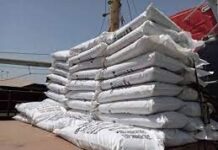th January, 2015 at the Paradise Suites Hotel in Kololi, the Ministry of  Environment, Climate Change, Water, and Wildlife in collaboration with the Department of Water Resources convened a one-day workshop to initiate the development of The Gambia’s INDC to the new Climate Agreement coming up for adoption in Paris, France in December, 2015 and that will be implemented from the year 2020. What is INDC? In the UNFCCC language, it simply means a Party (i.e. a country) reporting to the UNFCCC the levels of its national GHG emissions and the strategies and actions taken and to be taken to reduce those emissions to a level that will reduce global warming.
In his opening speech, the Minister of Environment, Climate Change, Water, and Wildlife, Honorable Pa Ousman Jarju stated,”We are gathered here to initiate the process of development of the Intended Nationally Determined Contribution (INDC) of The Gambia to the New Climate Agreement that is scheduled for adoption in Paris in December, 2015 and will be implemented from 2020.” The Honorable Minister went on to give the historical background to the start of the climate change convention in 1995 that led to the adoption of the Kyoto Protocol that could not adequately address the challenges of global climate change. The Minister stated that the Kyoto Protocol is inadequate because it is Mitigation-Centric and only some Developed Countries (like Japan, the European Union, Australia, etc.) have commitments to reduce their GHG emissions.
To further address the inadequacies in global GHG emission reductions, at UNFCCC meetings in 2011 at COP 17/CMP 7 in Durban, South Africa, Parties took a decision to develop a New Climate Agreement, through which ALL COUNTRIES, including The Gambia, will contribute to reduction of their GHG emissions which will hold the global temperature increase to 2oC and below. Finally, at the Lima, Peru sessions of the UNFCCC in December, 2014, Parties agreed to the Lima Call for Climate Action, which is a decision on the development and submission of INDCs to the UNFCCC Secretariat by October, 2015.
In concluding during his opening remarks, the Honorable Minister stated, “ As technicians participating in this endeavor, your undivided cooperation is required in developing this national document. Provision of data and information and your participation in the whole process of development of the document will make the product a national document containing national contribution and related concerns and interests. The information to be contained in the document may also include the base year, time frame for implementation, scope and coverage, planning processes, assumptions, and methodological approaches for estimating and accounting for anthropogenic greenhouse gas emissions and removals.”
The Gambia secured funding from the German Development Cooperation (GIZ) and Climate Development Knowledge Network (CDKN) to prepare her INDC. Two International Consultants, Ms. Sandra Freitas (of Togo) and Ms. Marion Vieweg (of Germany) of Climate Analytics (an international consulting firm based in the UK) are working with Gambian technical experts to prepare The Gambia INDC. Ms. Frietas made these remarks in her opening statement. “First of all, as one of the most vulnerable countries to the adverse effects of climate change and a country that has Chaired the Least Developed Countries (LDCs) Group in 2011 and 2012, The Gambia has played a key role in the adoption of the Durban Platform, the UNFCCC body under which the negotiation of the new Agreement is taking place. The Gambia is and has been for a long time one of the progressive countries in the negotiation process and shows leadership and commitment toward the adoption in Paris this year of a strong, universal and ambitious Agreement that will provide the most vulnerable countries with the guarantee that effective and deep emission reductions of greenhouse gases will occur. The future of countries like The Gambia depend on it.”
The workshop was attended by almost all sectors ( i.e. Regional Governors or their representatives, UTG, the business community, civil society organizations, and The Gambia government departments) of The Gambia economy. The next steps will include (a) Regional Workshops, (b) Political and Policy-maker Workshops, and (c) the final compilation and approval of the INDC document.
Sidat Yaffa, Ph.D.
Contact: [email protected]]]>
Environment, Climate Change, Water, and Wildlife in collaboration with the Department of Water Resources convened a one-day workshop to initiate the development of The Gambia’s INDC to the new Climate Agreement coming up for adoption in Paris, France in December, 2015 and that will be implemented from the year 2020. What is INDC? In the UNFCCC language, it simply means a Party (i.e. a country) reporting to the UNFCCC the levels of its national GHG emissions and the strategies and actions taken and to be taken to reduce those emissions to a level that will reduce global warming.
In his opening speech, the Minister of Environment, Climate Change, Water, and Wildlife, Honorable Pa Ousman Jarju stated,”We are gathered here to initiate the process of development of the Intended Nationally Determined Contribution (INDC) of The Gambia to the New Climate Agreement that is scheduled for adoption in Paris in December, 2015 and will be implemented from 2020.” The Honorable Minister went on to give the historical background to the start of the climate change convention in 1995 that led to the adoption of the Kyoto Protocol that could not adequately address the challenges of global climate change. The Minister stated that the Kyoto Protocol is inadequate because it is Mitigation-Centric and only some Developed Countries (like Japan, the European Union, Australia, etc.) have commitments to reduce their GHG emissions.
To further address the inadequacies in global GHG emission reductions, at UNFCCC meetings in 2011 at COP 17/CMP 7 in Durban, South Africa, Parties took a decision to develop a New Climate Agreement, through which ALL COUNTRIES, including The Gambia, will contribute to reduction of their GHG emissions which will hold the global temperature increase to 2oC and below. Finally, at the Lima, Peru sessions of the UNFCCC in December, 2014, Parties agreed to the Lima Call for Climate Action, which is a decision on the development and submission of INDCs to the UNFCCC Secretariat by October, 2015.
In concluding during his opening remarks, the Honorable Minister stated, “ As technicians participating in this endeavor, your undivided cooperation is required in developing this national document. Provision of data and information and your participation in the whole process of development of the document will make the product a national document containing national contribution and related concerns and interests. The information to be contained in the document may also include the base year, time frame for implementation, scope and coverage, planning processes, assumptions, and methodological approaches for estimating and accounting for anthropogenic greenhouse gas emissions and removals.”
The Gambia secured funding from the German Development Cooperation (GIZ) and Climate Development Knowledge Network (CDKN) to prepare her INDC. Two International Consultants, Ms. Sandra Freitas (of Togo) and Ms. Marion Vieweg (of Germany) of Climate Analytics (an international consulting firm based in the UK) are working with Gambian technical experts to prepare The Gambia INDC. Ms. Frietas made these remarks in her opening statement. “First of all, as one of the most vulnerable countries to the adverse effects of climate change and a country that has Chaired the Least Developed Countries (LDCs) Group in 2011 and 2012, The Gambia has played a key role in the adoption of the Durban Platform, the UNFCCC body under which the negotiation of the new Agreement is taking place. The Gambia is and has been for a long time one of the progressive countries in the negotiation process and shows leadership and commitment toward the adoption in Paris this year of a strong, universal and ambitious Agreement that will provide the most vulnerable countries with the guarantee that effective and deep emission reductions of greenhouse gases will occur. The future of countries like The Gambia depend on it.”
The workshop was attended by almost all sectors ( i.e. Regional Governors or their representatives, UTG, the business community, civil society organizations, and The Gambia government departments) of The Gambia economy. The next steps will include (a) Regional Workshops, (b) Political and Policy-maker Workshops, and (c) the final compilation and approval of the INDC document.
Sidat Yaffa, Ph.D.
Contact: [email protected]]]>
Home Farmer's Eye A TECHINCAL WORKSHOP ON THE PREPARATION OF THE GAMBIA’S INTENDED NATIONALLY DETERMINED...


















